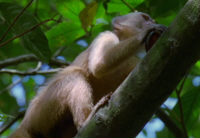Apple Snail
Mother Nature's Great Recycler
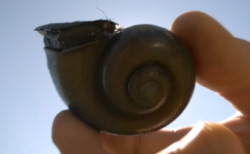
Apple Snail
Now, you might expect my hero of the Pantanal to be one of the large creatures that we've already seen, but brace yourselves… My hero… Is
this, the apple snail.
And I can tell you that, without this humble animal, the Pantanal wouldn't – couldn't – be such a rich environment. But how on Earth can
a snail be so important?
The Apple snail spends much of its life on the river bed, safe from most of its predators. It has a fish-like Gill that can remove oxygen
from the water, so it can breathe beneath the surface. Here, there's plenty of food…
Because there's nothing that an apple snail like more to eat, than dead and decaying vegetation. Its teeth can saw through the toughest
plant fibres and, unlike most animals, it can digest cellulose. But like all animals, it needs to relieve itself and that's when the magic
happens. It's miraculously recycled all that dead material back into accessible nitrogen and phosphorous. Five-star fertiliser for the
next generation of plants.
But that's not the only way this species recycles essential nutrients. For hundreds of predators, apple snails make a very tasty meal.
Young caimans particularly enjoy them. And each mouthful helps spread the vital ingredients of all life around the Pantanal. It's thanks to
all of this recycling by the Apple Snail that the Pantanal is so full of so many giants.
But, in order to carry out this pivotal role, the snail has to overcome one huge challenge – one which puts the whole ecosystem of the
Pantanal on a knife edge.
April brings rains to the highlands across central South America. For months, the Pantanal has been drying into a patchwork of small pools
and grass. But now, the rivers swell. They burst their banks and drown the grassy plains.
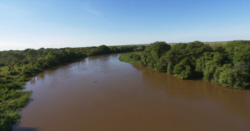
Swollen River
This is the most dangerous time for this ecosystem, because the most important ingredient for life is running out. Clearly, there's no shortage
of sunshine here. Nor is there any shortage of nutrients. No, what's in surprisingly short supply in these waters, is oxygen. As billions of tonnes
of grass is swamped, it begins to decay… Stagnating the water and robbing it of that oxygen. The Pantanal the suffocating.
It will only survive if that rotting grass is rapidly recycled into new forms of life. The Pantanal now needs the apple snail more than ever.
But without oxygen, not even it can survive. Thankfully, it has a secret weapon.
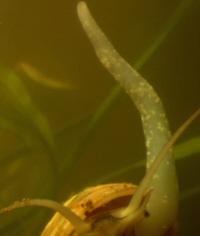
Apple Snail Snorkel
Uniquely amongst snails, it possesses a beautifully-evolved, telescopic appendage… a snorkel. The snail pumps air straight into a special
lung. And when it's breathed enough, it returns to what it does best – processing that rotting grass.
So whatever this place throws at them, billions of apple snails keep munching away and fertilising the Pantanal.
The aquatic ecosystem flourishes, supporting enough fish to satisfy the king of the river. The giant otter. Their vocalisations are constant,
this family party, constantly in touch with one another. These screeching calls are territorial – warning other animals that this group owns
this stretch of river, and all the fish in it. Any rivals are aggressively dealt with.
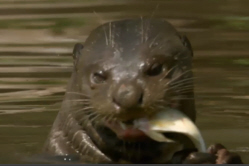
Giant Otter Feeding
The whole family regularly patrols a stretch of up to 20 km. And there's nothing that frightens them – not even caimans. Now that they've
got the river to themselves, it's down to the business of catching fish. And their appetites are insatiable. Each animal needs to eat a
tenth of its body weight every day.
In the Pantanal, there really is plenty for everyone, and it's all thanks to a mollusc. For me, the most important species in the Pantanal is
the Apple Snail. It's a true keystone species, involved in everything that's going on here. It converts fish and other matter into grass. Grass
and aquatic vegetation into food. It's even food itself, and it can survive anything that this place can throw at it.
It shapes and structures
the Pantanal. Therefore, it's what we call an ecosystem engineer. Without it, all those millions of caimans, the capybara, the Jaguar, and
especially the giant otter, would struggle to live here. And that's why the giant otter needs the snail.
The tireless work of apple snails over millions of years has helped to create the Pantanal. And all over the planet, from the Florida
Everglades, to the Fens of East Anglia, to the Nile, freshwater snails and other wetland creatures recycle material on an epic scale,
sustaining water ecosystems, and making them rich in life. And thanks to these animals, the impact of wetlands on the planet is huge.
At one end of the wetland, the raging water from mountain streams is soaked up like a giant sponge. At the other, it's released in a
steady flow. In doing so, these wetlands ensure that the rivers and the animals downstream get a reliable supply of water.

